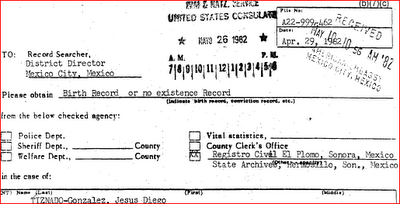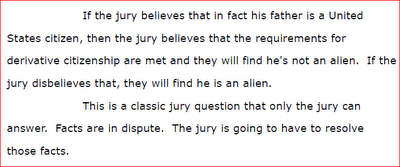
FOIA response--New evidence, United States government possesses official Mexican documents contradicting DHS and prosecution assertions that Esteban's father was born in Mexico
As reported here several months ago, a jury found Esteban Tiznado had acquired U.S. citizenship at birth, through his father Jesus Tiznado, but in late 2011 Immigration and Customs Enforcement (ICE) deported him anyway. ICE continued to insist that his father was born in Mexico and not the United States, Jesus's Arizona birth certificate notwithstanding. (Jesus is now deceased.)
Esteban returned to Arizona in 201
2, was arrested because of his deportation order, and for almost two months has been in an immigration jail, awaiting a June 4, 2012 hearing.
Documents recently received in response to a request under the Freedom of Information Act show that the government actually approved Esteban's petition for U.S. citizenship in 1980 but never informed him or his siblings of this, and then pursued efforts to reverse the approval, going so far as to hide records from its own investigation that confirmed Esteban's claim to U.S. citizenship. The result has been the ethnic cleansing of Esteban and his family from their rightful places in their Tucson homes and history.
From Esteban's 1084 page file, of which 148 pages were redacted in their entirety:
INS Never Sends Esteban's February 17, 1980 Citizenship Approval.
Note that there is nothing to indicate that there was any tampering or fraud involved with the documents submitted and that they were "seen and returned." Nonetheless, On May 1, 1989, an ICE predecessor agency Immigration and
Naturalization Service (INS) agent wrote a letter to Jesus Tiznado stating that it was
revoking the approval he never received.
1982 Investigation
Two years after approving the Tiznado petition to recognize Esteban as a U.S. citizen, the INS Tucson office initiated an investigation into the validity of Jesus Tiznado's delayed birth certificate showing birth in Topawa, Arizona.
In a request of the Mexican government to search for "Birth Record or no existence Record" for Jesus in El Plomo, Sonora and Hermosillo, Sonora, the INS officer wrote: "several of the children have his place of birth as Topawa, Az. and several have it as El Plomo, Son., Mexico. The ones that show Arizona have been altered...It is possible that we have a suspect third party agency involved."
-The Mexican government conducted the search and a December 14, 1982 notation on this same document indicates the INS received documents from the Mexican government certifying its search of official and church records revealed no records of birth for Jesus Tiznado.
 1985 Investigation
1985 Investigation
Not content with these responses, the agency in 1985 continued its
efforts to purge Jesus and his children from the ranks of U.S.
citizens, requesting on this occasion a search of the records in Rancho
Vera Cruz, and requesting yet another request of the records of El
Plomo, both in the state of Sonora.
Not only were no documents found but the Mexican government issued several certificates stipulating that these records
did not exist.
Furthermore, Esteban's 1979 certificate of legitimacy issued by Mexico states
Jesus Tiznado was born in Topowa, Arizona, and shows no indications of
having been altered, nor does the INS suggest otherwise.
Indeed, INS records also show that immediately upon copying the records, the
originals were all returned, raising questions about the basis for the
officer's assertions that they were "visibly altered."
2010 ICE Arrest Report States Jesus Born In Topawa, Arizona
Furthermore, ICE's own recent records indicate Jesus Tiznado IS a U.S. citizen.
An October 18, 2010 ICE warrant of arrest and removal issued in Salt Lake City for Esteban indicates that Jesus Tiznado's nationality is "United States."
(Why did they nonetheless deport Esteban again? Because that's what ICE does. The ICE arrest report notes Tiznado's 2000 conviction for Illegal Reentry but has no reference to the more recent Not Guilty verdict from his trial on the same charge in 2008.)
Why the change between 1980 and thereafter?
The May 1, 1989 letter states the reasons for this decision: "an investigation into the documentation used to obtain the delayed birth certificate [for Jesus], documents relating to other family members, and the testimony of various family members which is a matter of record..."
An undated report titled "Esteban Tiznado-Reyna, United States Citizenship Analysis" by DHS Assistant Chief Counsel Robert C. Bartlemay appears to have been prepared in late 2011, after Esteban had emphasized to his most recent ICE captors the 2008 jury Not Guilty verdict based on his U.S. citizenship. It appears to be a justification for proceeding with his deportation despite evidence of Esteban's U.S. citizenship.
This analysis provides the most explicit factual allegations for this reversal. It is a deeply disturbing document, and will be more so if it turns out to be representative of how the Tucson office was handling citizenship applications for people of Mexican descent.
For its 2008 Illegal Reentry prosecution, the U.S. claimed that Esteban's sister's birth certificate indicated that Jesus was born in Rancho Vera Cruz, an assertion the jury rejected after hearing the testimony of USCIS officer Jaime Yslas and that Bartlemay reiterates.
Bartlemay never mentions any of the the Mexican government's research falsifying the U.S. government's
claim Jesus was born in any of the places INS claimed he was born,
including Rancho Vera Cruz. Bartlemay never reflects that the evidence in his own dossier shows only one government issued a birth certificate to Jesus Tiznado: the government of Arizona, in the United States of America.
Instead, Bartlemay wades into irrelevant and unsubstantiated minutiae, much of which is actually falsified by the agencies' own records. This includes asserting that Esteban's mother, "stated before an immigration officer that Respondent's father was a native and citizen of Mexico" and that "Respondent's father used one of his brother's paperwork to claim birth in the United States." (Under oath during the trial and when I spoke with her, Julia denied ever making this statement and the government has produced no specific evidence of this alleged statement; other records attribute the statement to the daughter and it appears Bartemay just misread this.)
More importantly, anyone with a passing familiarity with the documents, especially a government immigration attorney, would realize that such a claim can't possibly be true: all of the government documents the agency credits with (falsely) asserting Jesus's U.S. citizenship are in relation to Jesus's children or his wife. That is, Esteban's and his siblings' birth certificates, Julia's marriage certificate, and the birth certificates of the other siblings are all from documents for Jesus's family members, not that of his brother, Miguel.
The only other document at issue that could have been altered would be the baptismal certificate, but I personally verified with the Pagago church that they have an entry in their original 1924 books for the baptism of Jesus Tiznado, as well as an earlier one for his brother Miguel, a point volunteered by the woman doing this search for me because someone had recently contacted them for this information to prove the U.S. citizenship of Miguel's grandson and Esteban's cousin, Humberto Tiznado. (Humberto had been deported several times but in 2011 was issued his Certificate of Citizenship, thus confirming that these earlier actions were unlawful.)
There are a few other points Bartlemay raises to cast doubt but all of them are contentious and lack documentation, in contrast with the documentary evidence Jesus was born in Arizona. For instance, Bartlemay credits his daughter's alleged statement that Jesus was born in Mexico (she also denied under oath making this statement) but discounts a sworn statement about Jesus's birth in Arizona: "The affidavit prepared by Respondent's friend stated that he met Respondent's father when he [the Respondent] was three years old, and therefore could not provide evidence regarding the father's place of birth."
Who is more likely to have more immediate historical knowledge of a family's actual residence, an adult who knew Jesus Tiznado and his family since he was three, or Jesus's daughter, who denies making any statement indicating Jesus was born in Mexico and more importantly for these purposes was not cognizant of her family history until her father was an adult?
True enough, the burden of proof is on Esteban to come up with the documents proving he meets the criteria for acquired U.S. citizenship but the standard does not require people to overcome trumped up analyses based on secret and uncorroborated so-called evidence.
What Next?
Esteban has a hearing at the Florence Immigration Court scheduled for June 4, 2012. This is a master calendar hearing, and thus it may be weeks or longer before Esteban's pro bono attorney David Ouimette has an opportunity to review the underlying documents or cross-examine the government experts.
Esteban's arrest a couple of months ago has devastated his family. According to his sister, he was picked up because the habeas order prohibiting his arrest had expired; when Esteban saw some police, he ran. And when they saw him running, then they chased him, caught him, and figured out he had been deported. He's being held in the wing of the Pinal County Jail under contract to ICE. At the very least ICE needs to release him pending a hearing on the merits of his case.
Arizona demonstrably issued Jesus Tiznado a birth certificate. The Mexican authorities demonstrably did not issue Jesus Tiznado a birth certificate. In light of this evidence, not to mention, the copious documentation of Jesus's residence in the United States for the requisite time periods, the DHS at the very least needs to comply with
John Morton's November 19, 2009 memorandum requiring ICE not to detain someone with possibly probative evidence of U.S. citizenship: ""In all case, any uncertainty of whether the evidence is probative of U.S. citizenship should weigh against detention."
For more on Esteban's case, please
go here.




















